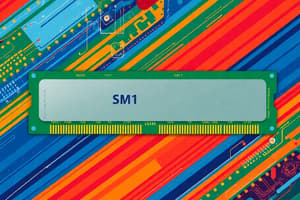Podcast
Questions and Answers
Apa itu Virtual Memory?
Apa itu Virtual Memory?
Virtual memory adalah fitur dari sistem operasi modern yang menciptakan ruang alamat virtual untuk setiap program, lebih besar dari memori fisik yang tersedia.
Apa itu Memory Protection?
Apa itu Memory Protection?
Memory protection adalah mekanisme keamanan yang mencegah program untuk mengakses wilayah memori yang bukan milik mereka.
Apa itu Memory Allocation?
Apa itu Memory Allocation?
Memory allocation adalah proses pemberian memori ke program atau tugas.
Bagaimana Virtual Memory diatur oleh sistem operasi?
Bagaimana Virtual Memory diatur oleh sistem operasi?
Apa yang dimaksud dengan paging?
Apa yang dimaksud dengan paging?
Bagaimana paging berbeda dari segmentasi dalam manajemen memori?
Bagaimana paging berbeda dari segmentasi dalam manajemen memori?
Mengapa paging sering dipasangkan dengan segmentasi dalam manajemen memori?
Mengapa paging sering dipasangkan dengan segmentasi dalam manajemen memori?
Apa saja teknik-teknik alokasi memori yang umum digunakan?
Apa saja teknik-teknik alokasi memori yang umum digunakan?
Mengapa segmentasi kurang umum digunakan dalam sistem operasi modern?
Mengapa segmentasi kurang umum digunakan dalam sistem operasi modern?
Mengapa penting untuk memahami konsep-konsep manajemen memori seperti virtual memory, memory protection, dan paging?
Mengapa penting untuk memahami konsep-konsep manajemen memori seperti virtual memory, memory protection, dan paging?
Study Notes
Managing Memory: A Deep Dive into System Operating Concepts
In the realm of system operating concepts, memory management is a foundational pillar for harnessing the full potential of a computer's hardware. As we delve into the subtopics of Virtual Memory, Memory Protection, Memory Allocation, and Paging, Segmentation, we'll explore the ways these concepts ensure efficient utilization of memory while maintaining system integrity and security.
Virtual Memory
Virtual memory is a feature of modern operating systems that creates a virtual address space for each program, larger than the physical memory available. This enables programs to access what appears to be a continuous block of memory, even if the actual physical memory is fragmented. The operating system manages this by swapping data and code between physical memory and secondary storage (such as a hard drive or SSD) as needed.
Memory Protection
Memory protection is a security mechanism that prevents programs from accessing memory regions that don't belong to them. Operating systems use memory protection to ensure that a malicious or errant program cannot manipulate system data or other programs' memory. Memory protection can be achieved through techniques like memory segmentation, paging, or a combination of both.
Memory Allocation
Memory allocation is the process of assigning memory to programs or tasks. Operating systems use algorithms and data structures to manage and optimize memory allocation. This ensures that memory is used efficiently and prevents programs from accessing unallocated memory, which could lead to crashes or other system failures. Memory allocation techniques include first-fit, best-fit, and worst-fit algorithms.
Paging
Paging is a memory management technique that divides the virtual address space of a program into fixed-size blocks called pages. These pages are stored in a secondary storage device, such as a hard disk, and are swapped in and out of physical memory as needed. Paging provides an efficient way to manage memory by allowing the operating system to allocate or reclaim memory in small units. Paging is often paired with segmentation, creating a hierarchical memory model.
Segmentation
Segmentation is a memory management technique that divides the virtual address space of a program into arbitrary-sized segments. Each program is assigned its own set of segments, which can be executed, stack, or data segments. Some operating systems, such as MS-DOS, used segmentation, but most modern operating systems utilize paging as a more efficient mechanism.
While segmentation has limitations and is less common than paging, its use in historical operating systems, such as MS-DOS, provided valuable insights that led to the development of paging, which is now a cornerstone of modern memory management.
Conclusion
Understanding and applying these concepts of memory management are essential to the functioning of modern operating systems. Incorporating techniques like virtual memory, memory protection, memory allocation, paging, and segmentation into the design of an operating system provides a solid foundation for managing memory effectively while ensuring system integrity and security. With the rapid growth of data and the demand for more efficient and secure computing, mastering these concepts will continue to be vital to the evolution of system operating principles.
Studying That Suits You
Use AI to generate personalized quizzes and flashcards to suit your learning preferences.
Description
Pelajari konsep-konsep dasar dalam manajemen memori seperti Memori Virtual, Perlindungan Memori, Alokasi Memori, dan Paging serta Segmentasi. Dengan mendalami topik-topik ini, Anda akan memahami bagaimana konsep-konsep tersebut memastikan pemanfaatan memori yang efisien sambil menjaga integritas dan keamanan sistem.




